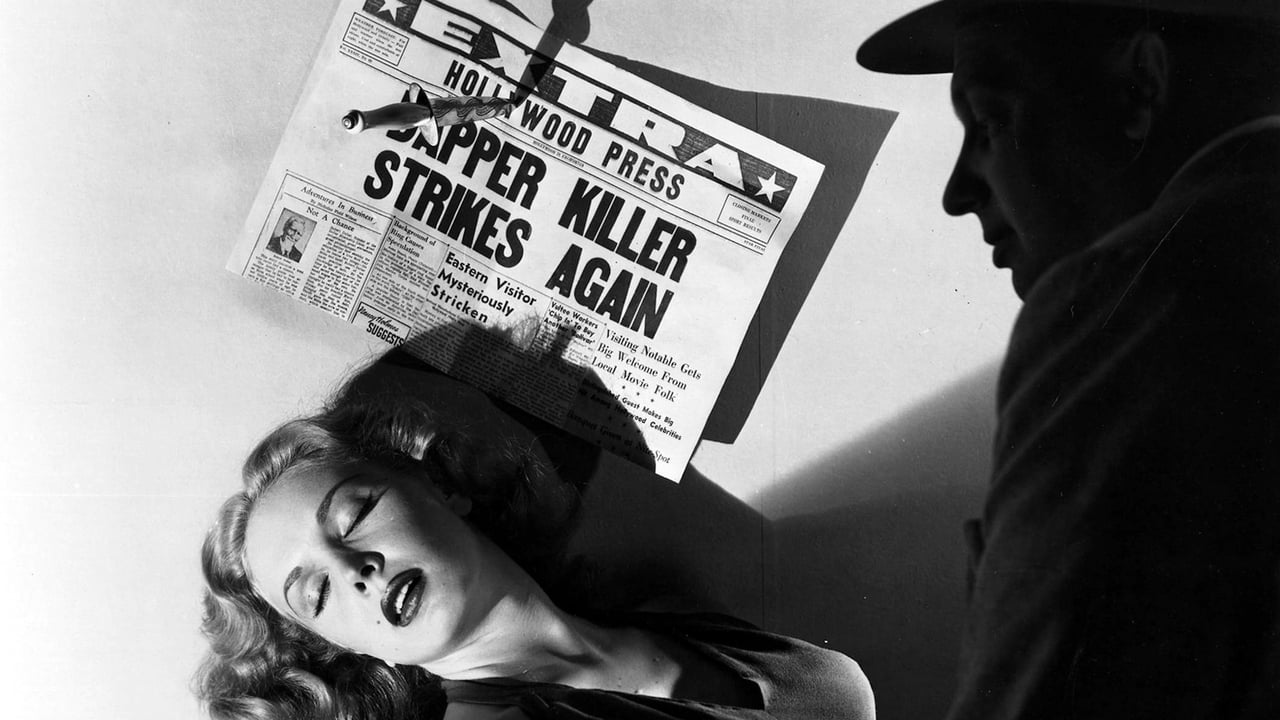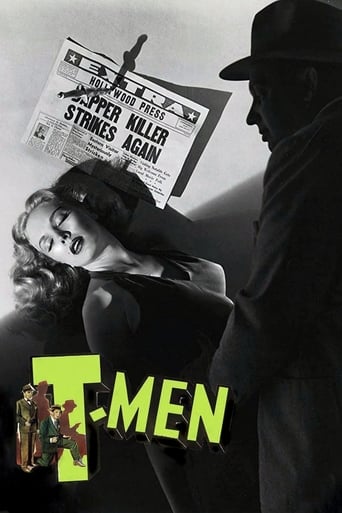

Truly Dreadful Film
... View MoreWhile it doesn't offer any answers, it both thrills and makes you think.
... View MoreExcellent characters with emotional depth. My wife, daughter and granddaughter all enjoyed it...and me, too! Very good movie! You won't be disappointed.
... View MoreIt's simply great fun, a winsome film and an occasionally over-the-top luxury fantasy that never flags.
... View MoreDirected by Anthony Mann, with a story by Virginia Kellogg that was adapted by John Higgins, this documentary-like film-noir taut crime drama details a single case involving the titled 'treasury men', whose job (among others) involves tracking down currency and federal liquor stamp counterfeiters.Dennis O'Keefe and Alfred Ryder play two such t-men who go undercover in Detroit and then San Francisco to catch the criminals. First, they pose as former members of the River Gang in order to infiltrate the Vantucci (Anton Kosta, uncredited) gang in Detroit; this leads them to San Francisco and Schemer (Wallace Ford), who is duped into getting them into the counterfeiting operation.Charles McGraw plays the operation's heavy, Jane Randolph (uncredited) an unexpected female one step below the top man. June Lockhart appears very briefly as Ryder's wife, who the undercover agent accidentally bumps into at a fish market. I believe that Evangeline, played by Mary Meade, is the photographer who leads O'Keefe to the counterfeiters expert technician named Miller, played by William Malten (uncredited).Other uncredited actors in the cast include: Jim Bannon as the t-man agent who acts as the go between the two undercover men and their chief, played by Herbert Heyes; Al Bridge as another go between in a phone booth; and Reed Hadley as the narrator.The film's Sound was nominated for an Academy Award, Jack Whitney's last Oscar nomination.
... View MoreAnthony Mann's "T Men" begins the way every war movie had begun for the previous seven years. The war had stopped in 1945 but the genre had been established and lived on. Behind the opening martial theme of the credits, there is one of those announcements about the film being dedicated to all the unsung heroes, etc. There is a guiding narration by Reed Hadley, similar to those in "Guadalcanal Diary" and "The House on 92nd Street." Then, in case we missed the point, there is a spoken introduction by some high level Treasury official who tells us all about the many branches and the valuable work done by his department. He mentioned the US Coast Guard last, and after a moment's hesitation. I found this offensive. The Coast Guard should have come first. I spent four years of my youth puking over the side of one or another cutter in the Pacific. True, we never saved anybody but we once brushed against a two-hundred foot whale. I guess that taught HIM a lesson.Dennis O'Keefe and Alfred Ryder are the two agents assigned to a case in which somebody is doing a splendid job of counterfeiting ten dollar bills and revenue stamps. (The minute I saw Ryder, nice guy, good side kick, married, I figured he wasn't long for this world.) They travel to Detroit (which still looked quite livable) and insinuate themselves into a gang. They soon pick up references to a big wig named "The Schemer" who lives in Los Angeles.And O'Keefe pursues him there with few clues. Because The Schemer is known to be fond of steam baths, O'Keefe spends hours in ten different steam baths before finding his man. Los Angeles had two million people at the time and it's hard to believe there were at least ten steam baths in the city. The only steam bath I've seen, outside of San Francisco, was in Butte, Montana, which had a sizable Finnish population at the time. So, yes, I'm dubious about all those steam baths in L.A.Steam baths aside, there are a couple of good things about this movie. For 1947 it's unusually violent. That's not necessarily a good thing but it does make it different from a run-of-the-mill case history. Mann's direction is distinctive too. He shoots from odd angles and once in a while, including floor level, there may be a startling shot with a pair of eyes in the foreground, a figure in medium shot behind, and still a third figure behind him. The photography by John Alton is very well done, perhaps the most accomplished element in the film. All of the above are improvements on the performance of the colorless Dennis O'Keefe, though some of the support does very well. Here is Charles McGraw with his gravel voice and face sculpted out of granite, looking like the kind of guy you don't want to meet in an alley.
... View MoreFilmed in a no-nonsense, semi-documentary style, 1947's T-Men vividly tells the tale of 2 undercover agents from the American Treasury Department in Washington, DC, who risk life and limb in order to infiltrate a ruthlessly clever organization of currency counterfeiters who have operations in both Detroit and Los Angeles.Moving from one flea-bag hotel to the next, agents O'Brien and Genaro diligently track down "The Schemer", a valued member of the Van Tucci mob, who eventually leads our heroes to Mr. Big.Filled with plenty of hard-hitting action and deadly double-crosses, T-Men is a gritty, hard-edged Crime/Drama that's sure to please any fan of Film Noir.Filmed in stark b&w, T-Men had a running time of 92 minutes.
... View MoreAnthony Mann here delivers another one of his superior noir films. The much-underrated leading man Dennis O'Keefe is terrific here. He is like a taller and tougher Alan Ladd, without the smile. This film is one of the 'investigation procedural' films of the period, complete with patronising narrator who explains to us what people we are watching are doing. 'T-Men' seems a corny title, but it is not about cartoon characters, 'T' stands for Treasury, and this is a tale of United States Treasury secret service agents infiltrating and busting a massive counterfeit ring in California. There are some crisp lines, and some lateral thinking in the story: 'If we are investigating Los Angeles, we will start in Detroit to avoid suspicion'. The story is based on real Treasury cases, and was made with the Treasury's full cooperation. We certainly learn a lot about paper quality (percentage of cotton, percentage of linen), engraved plates, photo processes, and we are almost ready to start our own presses tomorrow, except of course that crime does not pay, at least when Dennis O'Keefe is around. The next year, Anthony Mann would make 'Raw Deal', so he kept getting better. There was always plenty of tension with that Mann on the job.
... View More